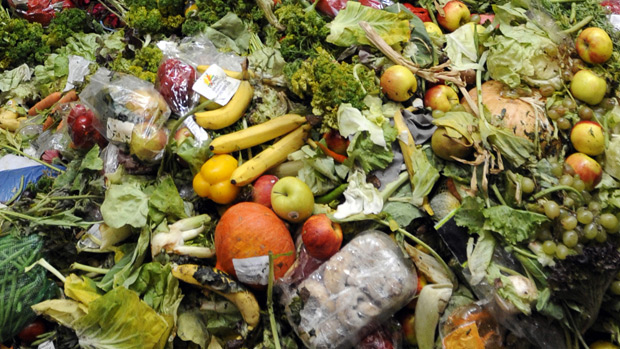Food waste: Britons are worst offenders in Europe
New study reveals extent of 'morally repugnant' wastage

A free daily email with the biggest news stories of the day – and the best features from TheWeek.com
You are now subscribed
Your newsletter sign-up was successful
Britain has the highest level of food wastage in the European Union, with each household binning 13lb of food a week.
A new study has revealed the EU wastes an estimated 22m tonnes of food each year and almost all of it is avoidable.
Vegetables, fruits and cereals are thrown out the most due to their short shelf life, but meat is also often wasted.
The Week
Escape your echo chamber. Get the facts behind the news, plus analysis from multiple perspectives.

Sign up for The Week's Free Newsletters
From our morning news briefing to a weekly Good News Newsletter, get the best of The Week delivered directly to your inbox.
From our morning news briefing to a weekly Good News Newsletter, get the best of The Week delivered directly to your inbox.
"In some ways it's good that this waste is 'avoidable', because it means we're able to do something about it," said lead researcher Davy Vanham, from the European Commission's Joint Research Centre. "A lot of food is still 'good' but is thrown away when it passes its sell-by date."
Researchers are calling for greater education, arguing that lowering wastage levels will save households money and reduce the impact on the environment.
Overly strict sell-by dates and middle class over-ordering both contributed to food waste, the Daily Telegraph reports. "We've noticed that there is less food waste as the population tends to have less money," said Vanham.
Politicians and supermarket bosses are also coming under increasing pressure to reduce levels of waste in Britain.
A free daily email with the biggest news stories of the day – and the best features from TheWeek.com
The Government is being urged to introduce legislation to ban supermarkets from throwing away or destroying surplus stock, following a similar ruling in France.
"Not only is [wasting food] morally repugnant, but it has serious economic and environmental implications," Baroness Scott, chair of the House of Lords committee on food waste, warned last year.
Food waste around the world
As much as half of all food produced in the world gets thrown away, amounting to more than 2bn tonnes of waste each year. It is estimated that the carbon footprint generated by the world's food waste is more than twice that created by the road transportation industry in America.
A recent study by the UK's Institution of Mechanical Engineers found that a number of factors were to blame for such staggering levels of waste, including poor harvesting, storage and transportation practices, overly strict sell-by dates, buy-one-get-one free offers and the consumer demand for "cosmetically perfect" food.
"This level of wastage is a tragedy that cannot continue if we are to succeed in the challenge of sustainably meeting our future food demands," the organisation warned.
Food waste in Britain
Up to 30 per cent of Britain's vegetable crop is never even harvested because their physical appearance doesn't meet exacting standards and millions of tonnes of edible food, especially fruits, vegetables and bread, are thrown away by supermarkets every year.
As the cost of living and levels of waste soar, skipping– taking unwanted food from supermarket rubbish bins – is on the rise in Britain. The practice is technically illegal, and while some do it as a moral statement or protest against capitalism and waste, others simply cannot afford to buy enough to eat.
Earlier this year, a desperate father was arrested for stealing bread and cheese from a locked Tesco compound to feed his family. "I was starving," Paul Barker told the Daily Mirror. "We would sometimes go two or three days without food. I just could not take it anymore”. He was later given an absolute discharge.
Ultimately, the largest proportion of discarded food comes from households. Britons throw away seven tonnes of food and drink from their homes annually - the majority of which is still edible. Avoidable household food is associated with 17 million tonnes of CO2 emissions every year.
What is being done?
Currently, the grocery and retail sector has a voluntary agreement with the government to reduce both food and packaging waste, but ministers "don't believe in mandatory targets," says The Guardian. All of Britain's largest supermarkets already work with charities to redistribute edible surplus food to local charities in some way, but only Sainsbury’s currently has a nationwide scheme in place. MPs are currently preparing to debate the possibility of introducing legislation to tackle food waste.
Despite the pressure on supermarkets, reducing waste in the home is the easiest way to limit food waste, say campaigners. The Love Food Hate Waste campaign urges households to take simple steps to make sure less of their food (and money) ends up in the bin, including only buying what you need, improving the storage of food and planning meals in advance.
-
 Are Hollywood ‘showmances’ losing their shine?
Are Hollywood ‘showmances’ losing their shine?In The Spotlight Teasing real-life romance between movie leads is an old Tinseltown publicity trick but modern audiences may have had enough
-
 A dreamy long weekend on the Amalfi Coast
A dreamy long weekend on the Amalfi CoastThe Week Recommends History, pasta, scenic views – this sun-drenched stretch of Italy’s southern coast has it all
-
 Can foster care overhaul stop ‘exodus’ of carers?
Can foster care overhaul stop ‘exodus’ of carers?Today’s Big Question Government announces plans to modernise ‘broken’ system and recruit more carers, but fostering remains unevenly paid and highly stressful